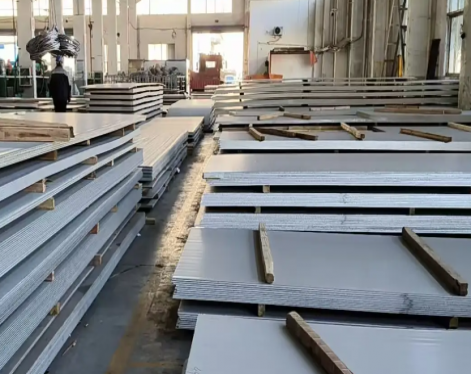What is L80 casing?
L80 casing is a grade of steel casing commonly used in the oil and gas industry for constructing wellbore walls during drilling operations. The "L" in L80 stands for "line pipe," while the number designates the minimum yield strength in thousands of pounds per square inch (ksi). In the case of L80, the minimum yield strength is 80 ksi. Pipes similar to L80 casing include K55 steel casing pipe and API 5CT J55 casing.
L80 casing is known for its high tensile strength, good resistance to internal pressure, and ability to perform well in harsh environments, making it suitable for use in challenging oil and gas well applications. Additionally, L80 casing can be further heat-treated to enhance its mechanical properties, such as increasing its hardness or improving its resistance to sulfide stress cracking.Overall, L80 casing is valued for its durability, corrosion resistance, and performance under high-pressure conditions, making it a popular choice for oil and gas well construction and completion.

What is API 5CT L80 equivalent to?
API 5CT L80 is generally considered equivalent to ASTM A514, a high-strength, low-alloy (HSLA) steel grade. Both API 5CT L80 and ASTM A514 are characterized by their high tensile strength and toughness, which make them suitable for demanding applications in the oil and gas industry, particularly for casing and tubing in well construction.It's important to note that while there may be similarities between API 5CT L80 and ASTM A514, each specification has its own unique requirements and characteristics, so it's essential to consult the specific standards, material data sheets, and engineering specifications when considering their equivalence for a particular application.
What is the difference between L80 and N80 casing?
The main differences between L80 and N80 casing lie in their chemical composition and mechanical properties, which impact their performance in oil and gas well applications:
(1)Chemical Composition
L80 casing typically has a higher content of carbon and manganese compared to N80 casing, which contributes to its higher tensile strength and hardness.
(2)Mechanical Properties
L80 casing exhibits higher minimum yield strength (80,000 psi) compared to N80 casing (80,000 psi vs. 95,000 psi). This makes L80 casing suitable for more challenging downhole environments that require greater toughness and resistance to mechanical stress.
(3)Heat Treatment
L80 casing is often subjected to controlled heat treatment processes to enhance its mechanical properties, such as improving its resistance to sulfide stress cracking, while N80 casing may be less commonly heat-treated.
In summary, L80 casing is known for its higher tensile strength and enhanced mechanical properties, making it suitable for more demanding downhole conditions, while N80 casing provides a balance of strength and cost-effectiveness for less extreme well environments. The choice between L80 and N80 casing depends on specific well conditions, regulatory requirements, and economic considerations for a given drilling operation.
L80 casing is a grade of steel casing commonly used in the oil and gas industry for constructing wellbore walls during drilling operations. The "L" in L80 stands for "line pipe," while the number designates the minimum yield strength in thousands of pounds per square inch (ksi). In the case of L80, the minimum yield strength is 80 ksi. Pipes similar to L80 casing include K55 steel casing pipe and API 5CT J55 casing.
L80 casing is known for its high tensile strength, good resistance to internal pressure, and ability to perform well in harsh environments, making it suitable for use in challenging oil and gas well applications. Additionally, L80 casing can be further heat-treated to enhance its mechanical properties, such as increasing its hardness or improving its resistance to sulfide stress cracking.Overall, L80 casing is valued for its durability, corrosion resistance, and performance under high-pressure conditions, making it a popular choice for oil and gas well construction and completion.

What is API 5CT L80 equivalent to?
API 5CT L80 is generally considered equivalent to ASTM A514, a high-strength, low-alloy (HSLA) steel grade. Both API 5CT L80 and ASTM A514 are characterized by their high tensile strength and toughness, which make them suitable for demanding applications in the oil and gas industry, particularly for casing and tubing in well construction.It's important to note that while there may be similarities between API 5CT L80 and ASTM A514, each specification has its own unique requirements and characteristics, so it's essential to consult the specific standards, material data sheets, and engineering specifications when considering their equivalence for a particular application.
What is the difference between L80 and N80 casing?
The main differences between L80 and N80 casing lie in their chemical composition and mechanical properties, which impact their performance in oil and gas well applications:
(1)Chemical Composition
L80 casing typically has a higher content of carbon and manganese compared to N80 casing, which contributes to its higher tensile strength and hardness.
(2)Mechanical Properties
L80 casing exhibits higher minimum yield strength (80,000 psi) compared to N80 casing (80,000 psi vs. 95,000 psi). This makes L80 casing suitable for more challenging downhole environments that require greater toughness and resistance to mechanical stress.
(3)Heat Treatment
L80 casing is often subjected to controlled heat treatment processes to enhance its mechanical properties, such as improving its resistance to sulfide stress cracking, while N80 casing may be less commonly heat-treated.
In summary, L80 casing is known for its higher tensile strength and enhanced mechanical properties, making it suitable for more demanding downhole conditions, while N80 casing provides a balance of strength and cost-effectiveness for less extreme well environments. The choice between L80 and N80 casing depends on specific well conditions, regulatory requirements, and economic considerations for a given drilling operation.









